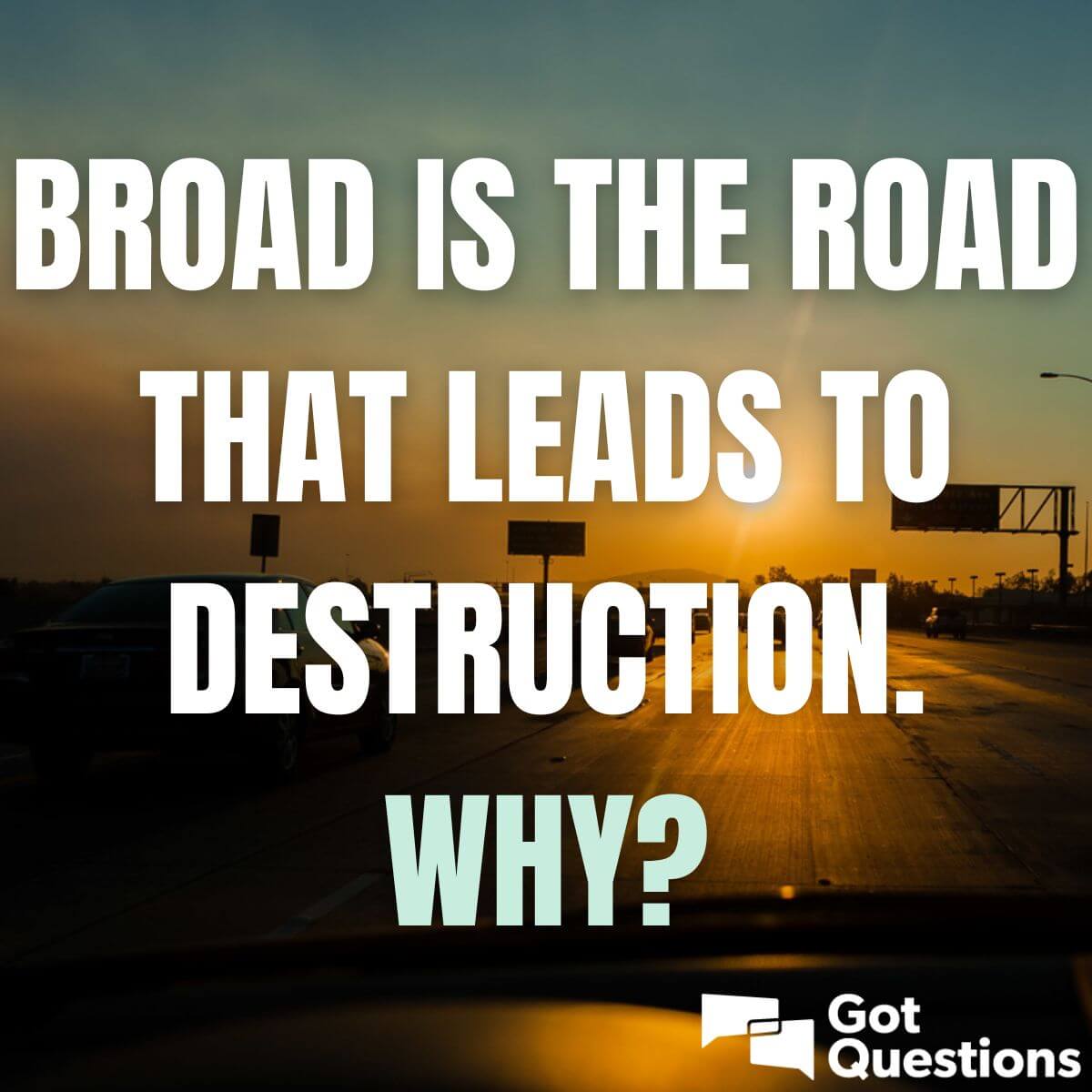In the realm of religious and philosophical discourse, the adage “Broad is the road that leads to destruction” serves as a cautionary beacon, delineating the path of moral and spiritual peril according to biblical texts. This concept extends beyond mere religious admonition; it engenders a conversation woven into the fabric of cultural relativism. Through the lens of various cultural perspectives, this exploration seeks to illuminate the multifaceted nature of this biblical warning, elucidating its implications within contemporary society.
At the core of this discourse lies the dichotomy between two metaphorical pathways: the broad road, which symbolizes ease and temptation, and the narrow road, indicative of challenges and adherence to moral rectitude. The biblical reference underscores the existential choices individuals face, suggesting that the populous inclination towards the broad road leads to collective moral decay and spiritual oblivion.
The cultural relativism perspective posits that moral and ethical values are not universally applicable but are instead contingent upon societal contexts. This doctrine prompts an inquiry into how diverse cultures interpret and internalize the notion of destruction associated with the broad road. For instance, in Western cultures characterized by individualism and materialism, the broad road may be emblematic of consumerism and secularism—elements seen as detracting from meaningful spiritual engagement.
Conversely, in collectivist societies, the narrow road may represent adherence to communal values and traditions, while the broad road could symbolize the encroachment of globalization and foreign influences. This divergence underscores the necessity of examining cultural contexts when interpreting moral precepts. The stark contrast between these pathways invites a nuanced analysis of how values propagate in various cultures and impact communal identities.
Furthermore, the metaphor extends to political and social constructs. In many contemporary societies, the broad road can be perceived as a metaphor for political apathy and the surrender of civic responsibilities. This phenomenon may stem from the intoxicating allure of convenience, where individuals opt for comfort over engagement. Such an inclination warns of the potential demise of democratic principles, where apathy leads to tyrannical ideologies taking root.
In examining specific cultural reactions to this biblical warning, one might consider the role of education in shaping moral perspectives. In highly developed societies, enlightenment ideals advocate for critical thinking and skepticism toward dogmatic beliefs. This intellectual pursuit may lead some to nullify traditional interpretations of the broad road, advocating instead for a more relativistic morality that embraces diversity. However, this position can also foster nihilism, where the lack of absolute values contributes to societal fracturing—echoing the warnings of scripture.
The juxtaposition of modern secular ideologies against spiritual narratives invites a critical evaluation of their underlying motivations. Is the pursuit of hedonism on the broad road a testament to human nature, or does it reflect cultural disillusionment? Engaging with these inquiries, it becomes evident that different cultures untangle these issues through unique narratives, shaping their understanding of morality and consequence.
Moreover, the ramifications of choosing the broad road weave into the fabric of intergenerational transmission of values. In many societies, elders impart wisdom rooted in traditional belief systems, warning the youth of the pitfalls of the broad road. However, contemporary youth, often disillusioned with antiquated ideologies, may adopt a more fluid ethic. This generational rift cultivates a dynamic discourse, inciting debates on reconciling traditional wisdom with modern sensibilities.
The moral ambiguity presented by the broad road is further exacerbated by technology and social media in an increasingly interconnected world. These platforms often propagate ideals that align more closely with broad road philosophy—instant gratification, superficial connections, and moral relativism. However, even within this vast digital landscape, subcultures have emerged that advocate for introspection, mindfulness, and the pursuit of deeper values. The interplay between technology and cultural values exemplifies the complexities of navigating the modern world.
As this cultural dialogue continues, it is imperative to empower individuals with the ability to discern the implications of their choices. Education plays a pivotal role in fostering an understanding of ethical dilemmas and encouraging critical thinking. Integrating comprehensive moral education in school curricula can provide young individuals with the tools necessary to navigate the ramifications of their paths—be it the broad or the narrow road.
In conclusion, the biblical warning of a broad road leading to destruction serves as a multifaceted symbol that resonates deeply across diverse cultures. This metaphor invites a thorough interrogation of moral frameworks within various societal contexts, prompting individuals to reflect on the consequences of their choices. An appreciation for the complexities of cultural relativism enriches the discourse surrounding this admonition, suggesting that the journey along these roads is inherently subjective, shaped by an intricate interplay of values, traditions, and modern influences. Ultimately, the path one chooses is reflective of a tapestry of cultural influences, personal beliefs, and collective histories, underscoring the profound significance of individual agency in the face of existential choices.
